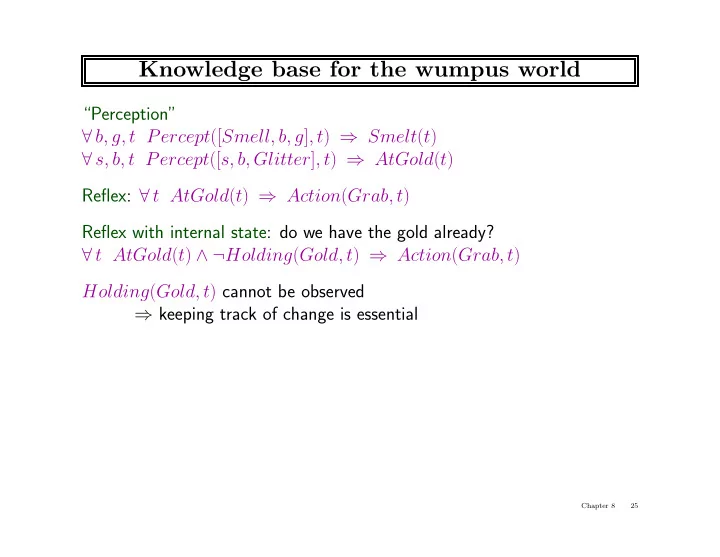

Knowledge base for the wumpus world “Perception” ∀ b, g, t Percept ([ Smell, b, g ] , t ) ⇒ Smelt ( t ) ∀ s, b, t Percept ([ s, b, Glitter ] , t ) ⇒ AtGold ( t ) Reflex: ∀ t AtGold ( t ) ⇒ Action ( Grab, t ) Reflex with internal state: do we have the gold already? ∀ t AtGold ( t ) ∧ ¬ Holding ( Gold, t ) ⇒ Action ( Grab, t ) Holding ( Gold, t ) cannot be observed ⇒ keeping track of change is essential Chapter 8 25
Deducing hidden properties Properties of locations: ∀ x, t At ( Agent, x, t ) ∧ Smelt ( t ) ⇒ Smelly ( x ) ∀ x, t At ( Agent, x, t ) ∧ Breeze ( t ) ⇒ Breezy ( x ) Squares are breezy near a pit: Diagnostic rule—infer cause from e ff ect ∀ y Breezy ( y ) ⇒ ∃ x Pit ( x ) ∧ Adjacent ( x, y ) Causal rule—infer e ff ect from cause ∀ x, y Pit ( x ) ∧ Adjacent ( x, y ) ⇒ Breezy ( y ) Neither of these is complete—e.g., the causal rule doesn’t say whether squares far away from pits can be breezy Definition for the Breezy predicate: ∀ y Breezy ( y ) ⇔ [ ∃ x Pit ( x ) ∧ Adjacent ( x, y )] Chapter 8 26
Keeping track of change Facts hold in situations, rather than eternally E.g., Holding ( Gold, Now ) rather than just Holding ( Gold ) Situation calculus is one way to represent change in FOL: Adds a situation argument to each non-eternal predicate E.g., Now in Holding ( Gold, Now ) denotes a situation Situations are connected by the Result function Result ( a, s ) is the situation that results from doing a in s PIT PIT Gold PIT PIT PIT Gold S 1 PIT Forward S 0 Chapter 8 27
Describing actions I “E ff ect” axiom—describe changes due to action ∀ s AtGold ( s ) ⇒ Holding ( Gold, Result ( Grab, s )) “Frame” axiom—describe non-changes due to action ∀ s HaveArrow ( s ) ⇒ HaveArrow ( Result ( Grab, s )) Frame problem: find an elegant way to handle non-change (a) representation—avoid frame axioms (b) inference—avoid repeated “copy-overs” to keep track of state Qualification problem: true descriptions of real actions require endless caveats— what if gold is slippery or nailed down or . . . Ramification problem: real actions have many secondary consequences— what about the dust on the gold, wear and tear on gloves, . . . Chapter 8 28
Describing actions II Successor-state axioms solve the representational frame problem Each axiom is “about” a predicate (not an action per se): P true afterwards [ an action made P true ⇔ P true already and no action made P false ] ∨ For holding the gold: ∀ a, s Holding ( Gold, Result ( a, s )) ⇔ [( a = Grab ∧ AtGold ( s )) ∨ ( Holding ( Gold, s ) ∧ a � = Release )] Chapter 8 29
Making plans Initial condition in KB: At ( Agent, [1 , 1] , S 0 ) At ( Gold, [1 , 2] , S 0 ) Query: Ask ( KB, ∃ s Holding ( Gold, s )) i.e., in what situation will I be holding the gold? Answer: { s/Result ( Grab, Result ( Forward, S 0 )) } i.e., go forward and then grab the gold This assumes that the agent is interested in plans starting at S 0 and that S 0 is the only situation described in the KB Chapter 8 30
Making plans: A better way Represent plans as action sequences [ a 1 , a 2 , . . . , a n ] PlanResult ( p, s ) is the result of executing p in s Then the query Ask ( KB, ∃ p Holding ( Gold, PlanResult ( p, S 0 ))) has the solution { p/ [ Forward, Grab ] } Definition of PlanResult in terms of Result : ∀ s PlanResult ([ ] , s ) = s ∀ a, p, s PlanResult ([ a | p ] , s ) = PlanResult ( p, Result ( a, s )) Planning systems are special-purpose reasoners designed to do this type of inference more e ffi ciently than a general-purpose reasoner Chapter 8 31
Summary First-order logic: – objects and relations are semantic primitives – syntax: constants, functions, predicates, equality, quantifiers Increased expressive power: su ffi cient to define wumpus world Situation calculus: – conventions for describing actions and change in FOL – can formulate planning as inference on a situation calculus KB Chapter 8 32
Recommend
More recommend